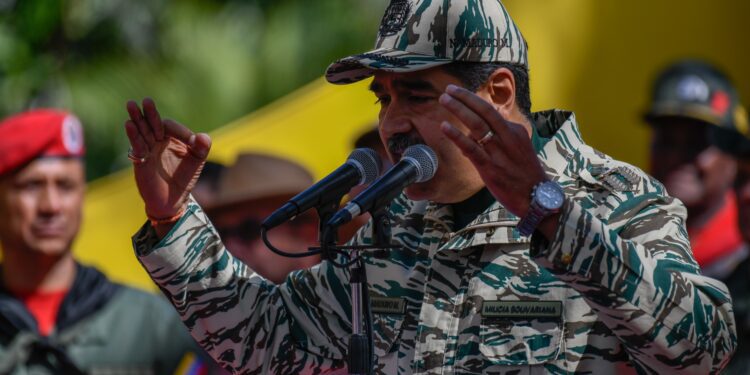The repercussions of the July 28 election in Venezuela continue to grow, as President Nicolás Maduro’s refusal to release the ballots from the election to certify the vote count announced by Venezuela’s National Electoral Council has driven a wedge into relations in what was once a relatively closely aligned bloc of left-wing Latin American nations. Daniel Ortega, the president of Nicaragua and a close ally of Maduro in Venezuela, on Monday sharply criticized Colombia’s President Gustavo Petro and Brazil’s President Luiz Inácio Lula da Silva for their continued insistence that Venezuela release proof of Maduro’s victory in July.
“If you want my respect, you will respect me, Lula. If you want the respect of the [Venezuelan] people, you will respect the victory of President Nicolás Maduro, instead of being dragged around,” Ortega said. “Petro? What can I say with regard to Petro? Poor Petro… Petro, I see as competing with Lula to see who will be the leader to represent the Yankees in Latin America.”
Petro responded with a broadside of his own the next day. “Daniel Ortega has said we are being ‘dragged around’ just because we want a peaceful and democratic negotiated solution in Venezuela,” he wrote in a post on X. “At least I do not drag through the dirt the human rights of my country’s people, much less those of my brothers in arms and my companions in the fight against dictatorship.”
Ortega’s angry outburst follows a joint effort by the two countries to gingerly renegotiate their relationship with Maduro. While Ortega, Petro, and Lula—along with President Andrés Manuel López Obrador of Mexico—have traditionally supported Maduro against the more right-wing governments of the region and what they perceive as the hostile interests of the United States, Maduro’s doubtful reelection and his increasingly harsh repression of the Venezuelan populace have precipitated a rift between the authoritarian left of Maduro and Ortega and the more democratic left of Lula and Petro.
In many ways, it is not surprising that the Brazilian and Colombian leaders would wish to distance themselves from the increasingly violent and unstable Venezuela. Both countries have suffered serious disruptions from fleeing Venezuelan refugees, whom Maduro refuses to allow to be deported back into the country. Moreover, linking domestic left-wing political movements with the situation in Venezuela is a losing proposition.
Petro in particular is in a precarious place. He is already considerably unpopular in Colombia, where conservatives consider him a traitor and appeaser for negotiating with the guerrilla narcoterrorists that infest the Colombian selva. This is a golden opportunity for him to burnish his democratic credentials and unchain himself from a sinking and regionally unpopular government.
The same rationale goes double for relations with Nicaragua’s Ortega, who has gone on a campaign of brutal retaliation and suppression in the past several years. The Catholic Church has been a particular focus of Ortega’s ire, after it supported protests against his government in 2018. Since then, 20 percent of the nation’s priests have been killed, imprisoned, or exiled—including nearly a score just this month. Hundreds more of Ortega’s political opponents were jailed leading up to and subsequent to the 2021 national elections, which—like the recent Venezuelan elections—were of doubtful legitimacy.
Subscribe Today
Get daily emails in your inbox
Ortega’s attack on the two South American leaders suggests that what was once a relatively robust coalition of left-wing governments in Latin America may be fracturing for good. Maduro now can only count on the support of Cuba, Nicaragua, Mexico and Bolivia. Colombia and Brazil, Venezuela’s most important neighbors, may soon join Gabriel Boric’s Chile as left-wing critics of Maduro.
Mexico’s position regarding Venezuela deserves closer attention. Immediately after the election, López Obrador joined Petro and Lula in calling on Maduro to release the ballots from the election. He quickly changed his tune, however, and endorsed Maduro, arguing that he sees no reason not to trust Venezuela’s National Electoral Council. This is a potentially concerning approach, given the president’s current efforts to dramatically rewrite Mexico’s constitution in ways that favor his own political party, including ending the independence of Mexico’s own National Electoral Institute. Continued convergence between Mexico, Nicaragua, and Venezuela should be considered a warning sign for the continued health of the Mexican political system. An authoritarian Mexico, even if it were far less harsh than the current Venezuelan or Nicaraguan governments, would be a major blow to American interests and to our ability to control our southern border.
On the other hand, the new distance opening up between Venezuela on the one hand and Colombia and Brazil on the other may provide new opportunities for amicable cooperation with the U.S. Left-wing Latin American governments are often hostile towards the U.S. for its long history of intervention in the region. But, with the specter of worldwide communism long gone, the U.S. should work for positive-sum engagement with democratic left-wing governments where reasonable—particularly as China will eagerly fill the deficit if Americans decline to step up.
Source link : http://www.bing.com/news/apiclick.aspx?ref=FexRss&aid=&tid=66d3bcccc4ae4fd4bd682a762d237496&url=https%3A%2F%2Fwww.theamericanconservative.com%2Fthe-growing-rift-in-the-latin-american-left%2F&c=8107844648846343548&mkt=en-us
Author :
Publish date : 2024-08-31 08:58:00
Copyright for syndicated content belongs to the linked Source.




